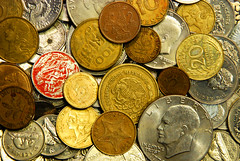http://www.tankinlian.com/faq/duali.html
I agreed that DCI seems to be bias against the investor as the investor assumed all the downside (thru being paid the selected currency should it trade lower than the strike price), while benefiting a limited upside from the appreciation of the currency (the bank takes the spread).

I've tried DCI and it was all initiated by the private banks. However, the tenor was short as it was only a month and I don't think I will want to delve in this too much. But both were successful (ie, paid in SGD principal + the 6% interest) as the strike price was quite low (around AUD1:SGD$1.22)
What the bankers say is that it's good to have currency exposure to the major currencies like USD, EUR and AUD and doing DCI allows you to participate and in the event that you get the USD/EUR/AUD, you can always utilised them by buying shares/funds/bonds of that currency (alot of products are still structured in USD/EUR) while the AUD can be kept in rolling fixed deposit to get the high interest rate (and you can convert it when it returns to your break-even point...but their view is that AUD currency is a good one to hold as it will not depreciate at least going forward 1 year).
I dunno... but the more I liase with them..the more I feel like there's a conflict of interest between wealth management bankers and their clients.